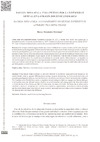Please use this identifier to cite or link to this item:
https://accedacris.ulpgc.es/jspui/handle/10553/114235
| Title: | Natalia Sosa Ayala: una apuesta por la diversidad sexual en la praxis docente literaria | Other Titles: | Natalia Sosa Ayala: a commitment to sexual diversity in literary teaching praxis | Authors: | Hernández Quintana, Blanca | UNESCO Clasification: | 6202 Teoría, análisis y crítica literarias 630909 Posición social de la mujer |
Keywords: | Didáctica Diversidad sexual Docencia Literatura Didactics, et al |
Issue Date: | 2021 | Conference: | XXIV Coloquio de Historia Canario-Americana | Abstract: | Si la mujer escritora sigue teniendo una escasa visibilidad en el canon literario y en las aulas, la mujer escritora lesbiana está ninguneada. Ofrecer estas lecturas supone desmontar el orden heteropatriarcal y ampliar los horizontes paradigmáticos, porque lo que no se nombra no existe y lo que carece de representación es ocultado. La escritora canaria Natalia Sosa crea un escenario textual propicio en el que entabla un diálogo literario para contar otra historia, su historia silenciada, lo que supone un acto de resistencia y valentía dado el contexto histórico que le toca vivir: el franquismo. Su obra denuncia la amenaza de un mundo que la obliga a negarse y a emprender un proceso de aceptación hasta erigirse en una representación simbólica, necesaria para reivindicar la pluralidad y las voces que reclaman otras formas de estar en la sociedad, necesaria porque rompe la estabilidad unidimensional que homogeneiza y anula la diferencia. If the female writer continues to have low visibility in the literary canon and in the classroom, the lesbian female writer is ignored. Offering these readings supposes dismantling the heteropatriarchal order and expanding paradigmatic horizons, because what is not named does not exist and what is not represented is hidden. The Canarian writer Natalia Sosa creates a propitious textual setting in which she engages in a literary dialogue to tell another story, her silenced history, which is an act of resistance and courage given the historical context in which she has to live: Francoism. Her work denounces the threat of a world that forces her to refuse and to undertake a process of acceptance until she becomes a symbolic representation, necessary to vindicate plurality and the voices that demand other ways of being in society, necessary because it breaks one-dimensional stability that homogenizes and cancels the difference. |
URI: | https://accedacris.ulpgc.es/handle/10553/114235 | ISSN: | 2386-6837 | Source: | Coloquio de Historia Canario-Americana [ISSN 2386-6837], n. XXIV(107) |
| Appears in Collections: | Actas de congresos |
Page view(s)
36
checked on Jan 10, 2026
Download(s)
7
checked on Jan 10, 2026
Google ScholarTM
Check
Share
Export metadata
Items in accedaCRIS are protected by copyright, with all rights reserved, unless otherwise indicated.
